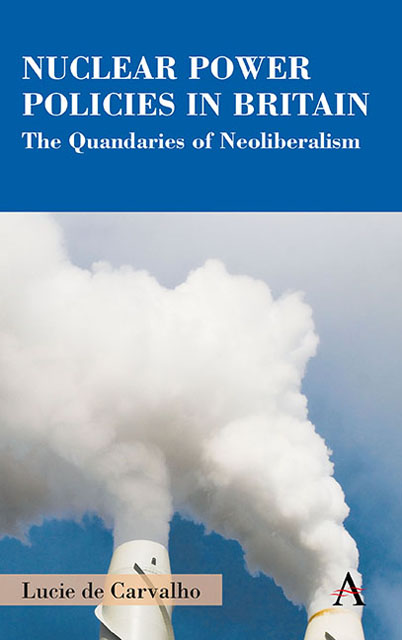Chapter Five - Nuclear as a Transboundary Object: The Weight of Subnational and Supranational Dynamics
Published online by Cambridge University Press: 10 January 2023
Summary
When reaching the implementation stage, nuclear decisions are submitted to regulation dynamics. Pre-Brexit, the specific situation of the UK as both a multinational state and a member of the European Union complexified policy implementation. Although national in structure, nuclear power transcends geographical boundaries, as nuclear activities are constrained by both direct and indirect regulation. Direct regulation covers nuclear activities management, while indirect regulation, which has expanded over the past thirty years, is primarily linked to climate change mitigation imperatives. Besides, today's domestic nuclear regulation is mostly impacted by international agreements and arrangements blending soft and rigid legal frameworks. ‘Soft regulation’ involves all forms of non-binding norms; on the other hand, decisions such as domestic regulations and European directives for fall into the hard rules category since they have normative and binding legal force. In that sense, the UK state finds itself grappling with an international system of checks and balances, dealing with supranational authorities overseeing these regulatory frameworks which cannot but alter the very nature of domestic regulatory decisions. UK nuclear policy stands de facto within the several interlocking frameworks of target-setting and regulation at both the supranational and subnational levels.
Beside technical regulation on safety and security matters, UK nuclear activities have come to be symbiotically intertwined with environmental and climate policies, especially since the turn of the 2000s, as encapsulated in the British Department of Energy and Climate Change (DECC) established in 2008 and dissolved in the 2016 ministerial reshuff le. Tony Blair's second and third terms in particular saw these two global matters converge and become a prime focus of attention on New Labour's agenda. From 2004, the Blair governments more actively engaged with environmental policies, after a first tenure devoted to constitutional, health and education reforms. Blair strove to position the UK as a world leader in the global fight against climate change. To that end, Blair sought to boost relations between the UK and other supranational authorities involved in climate change mitigation, including the UN or the EU.
Articulating nuclear matters with globalisation or Europeanisation dynamics has raised a lot of concerns regarding an alleged weakening of national sovereignty as well of state authority and capacity. In 1989, political scientist David Held had already warned against:
The international of production, finance and other economic resources […] eroding the capacity of the state to control its own economic future.
- Type
- Chapter
- Information
- Nuclear Power Policies in BritainThe Quandaries of Neoliberalism, pp. 147 - 178Publisher: Anthem PressPrint publication year: 2022

